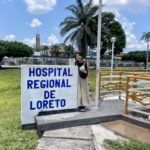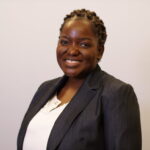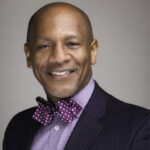March 11, 2020
Student Profile: Julie Skene

Julie Skene is the first nurse to enroll in the DNP- Population Health Nursing & Global Health MPH Concurrent Degree Program (learn more here!) The Center for Global Health Nursing asked Julie a few questions about her passion for nursing and why she decided to pursue this concurrent degree program.
Why did you choose nursing?
I chose nursing because I want a career that involves both helping others and promoting health. Also, there are so many different types of opportunities for nurses, I knew nursing would be a profession in which I could continually grow throughout my career. For example, when I switched from hospital-based nursing to school nursing, my focus changed to improving the health of the whole community. I developed a better understanding of the importance of population health and influencing change at a systems level which prompted my decision to return to school and learn more about global health nursing.
What has been an unforgettable experience during your time at the School of Nursing?
My DNP practicum at the Chinese Information and Service Center (CISC) for the past year has been unforgettable. Through this experience I have strengthened my cross-cultural nursing skills, learned how to effectively support immigrants and refugees in Seattle, and developed valuable relationships with the amazing staff at CISC. I will never forget how kind and welcoming everyone in the organization has been and how dedicated my CISC colleagues are to the vulnerable populations they serve.
How has your experience at nursing helped you with your career trajectory?
My experience has helped with my career trajectory by improving my leadership skills, self-confidence, and professional connections. Through mentorship from inspiring professors, gaining practical experience in the field, and taking a variety of classes, I feel prepared to take my career to the next level. Population Health DNP skills are a valuable resource to all types of organizations, and I am looking forward to finding a position that allows me to use my nursing perspective to work towards improving health globally.
Why did you decide to pursue a dual degree in Population Health Nursing and Public Health?
I decided to pursue a dual degree because of my strong interest in both nursing and global health. As a school nurse, I enjoyed working with a diverse community of immigrant and refugee families, and I hoped to learn more about how to effectively support these vulnerable populations. Additionally, I wanted to understand how population health-systems can be bolstered globally to make significant, positive impacts on health.
I knew that pursuing the Global Health MPH degree would strengthen my data analysis skills and result in a more in-depth understanding of global health concerns. While the DNP-PHN program would build upon my nursing knowledge and enhance my leadership and management skills. Together, these two programs support my goal of finding ways to increase access to care for marginalized communities and improve social determinants of health for vulnerable populations.
Can you define the difference between the two programs and how then talk about how they complement each other?
The DNP and MPH degrees complement each other by providing the student with a variety of experiences and perspectives with regards to population health both locally and globally. As part of the DNP program, I work closely with nursing colleagues to build on our prior experiences and learn how to apply knowledge at a systems-level.
The global health MPH program involves joining a larger cohort of students from all over the world. We are from a variety of disciplines, so the MPH is beneficial for nurses that seek to broaden their perspective and work with colleagues from other departments. The MPH program provides a deeper understanding of the history of global responses to health and the political determinants of health. There are also additional opportunities for practical experience through a practicum and thesis. I am working at the Department of Health this summer, completing a landscape analysis for the Early Hearing Detection, Diagnosis, and Intervention program.
How do you balance the two programs?
I’ve balanced the two programs by taking as many global health electives as possible during my first two years of the DNP program. During my third year, I completed my DNP practicum along with the MPH required classes. I will be here for a fourth year to complete the DNP Capstone Project and MPH thesis.
We know that as a part of the MPH Program, you participated in the Student Epidemic Action Leaders (SEAL) Team. Can you talk a little bit about your experience with the SEAL team?
As a member of the SEAL team, I am learning about applied epidemiology through in-person classes, at-home training, and field assignments at the Department of Health. As a SEAL, I have learned about the Incident Command System, contact tracing, cohort studies, and disease surveillance. I also completed an assignment working in a specimen accessioning and processing lab.




